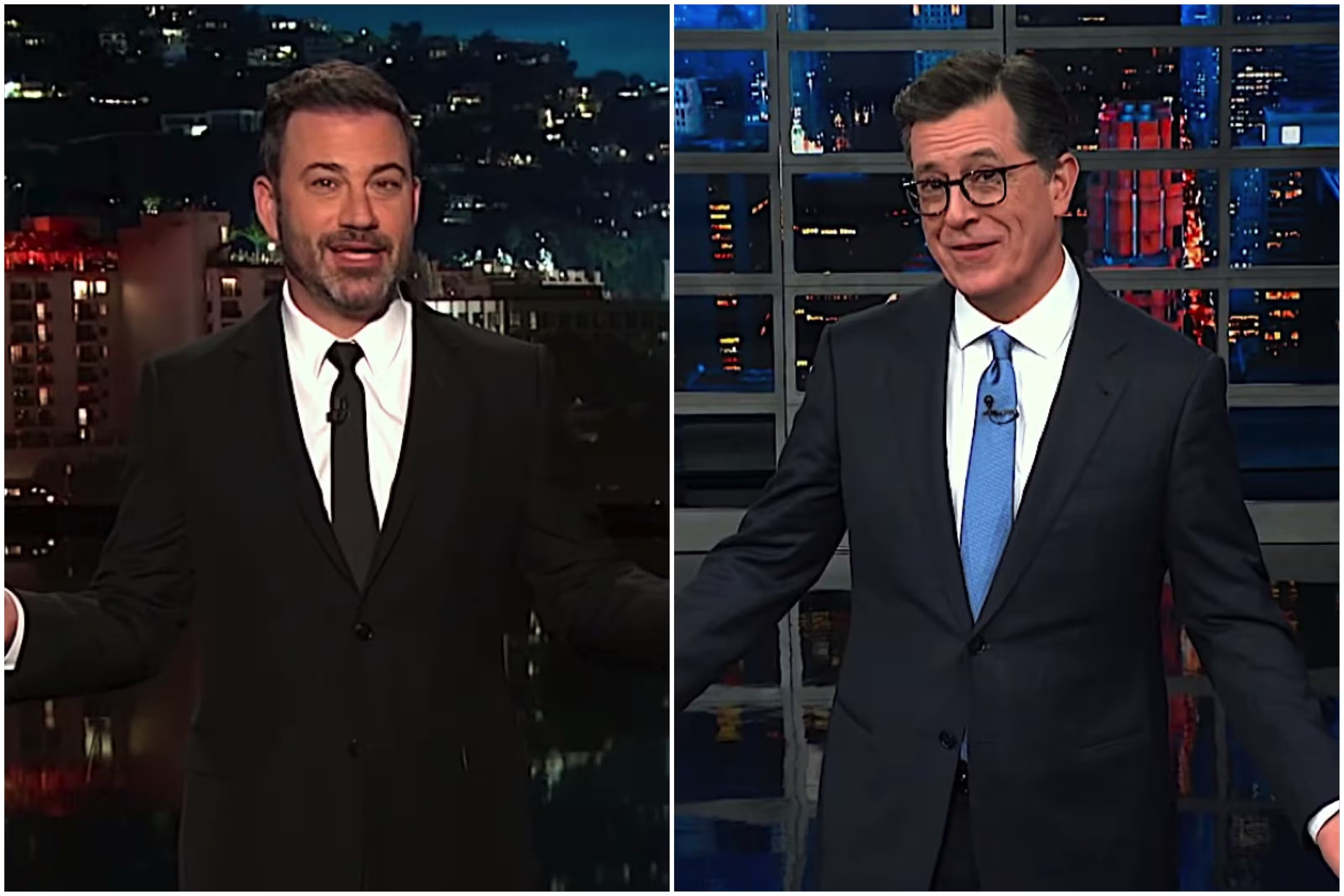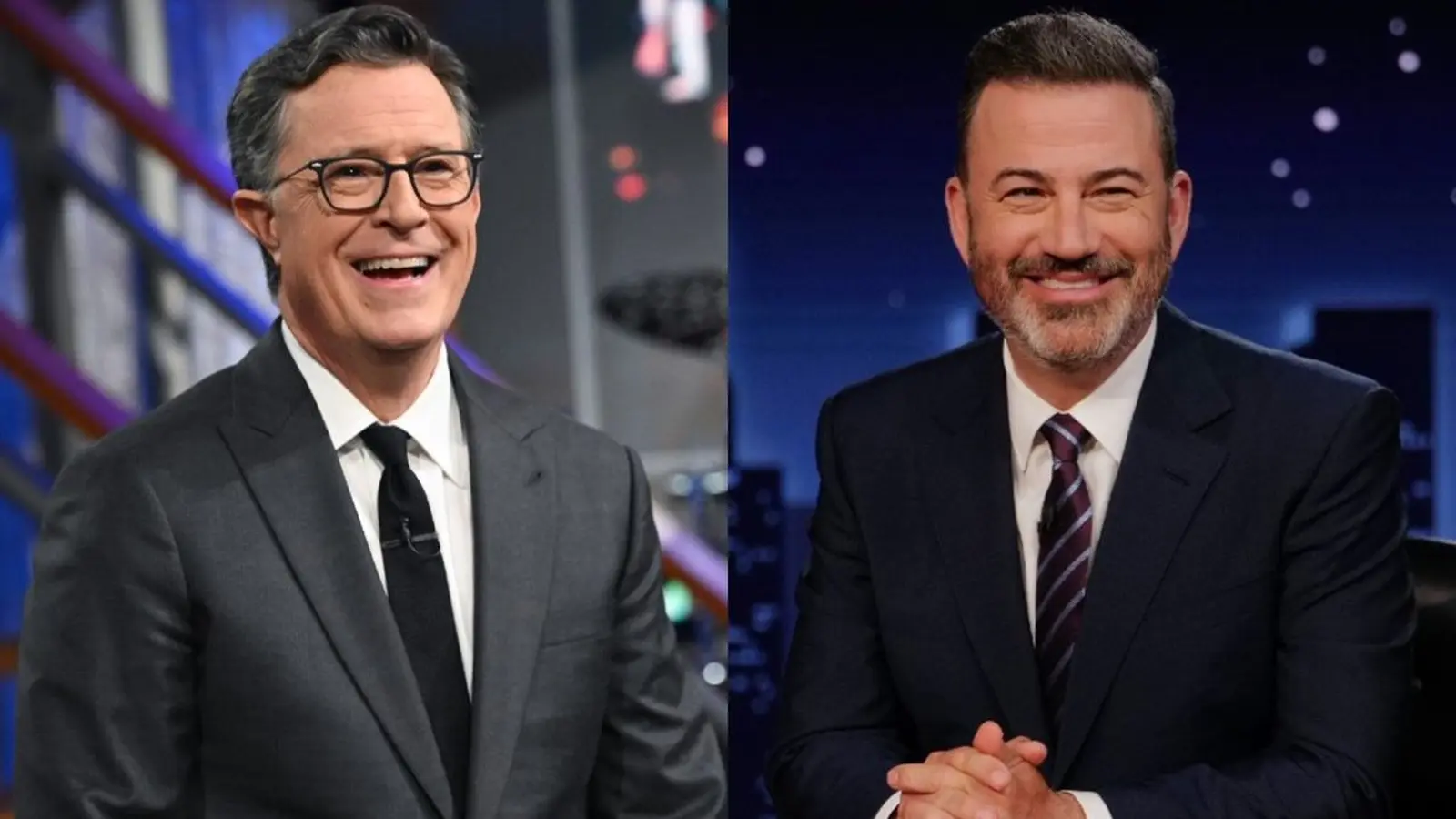6 Minutes
When late-night comedy meets geopolitics, the result is often a mix of sharp satire, awkward praise and cultural referencing that leans on film and TV imagery. On the Monday after a breakthrough Gaza ceasefire, Jimmy Kimmel and Stephen Colbert — two staples of American late-night — offered exactly that: reluctant but clear credit to President Donald Trump for brokering an agreement that led to the release of remaining Israeli hostages and the freeing of nearly 2,000 Palestinian prisoners, wrapped in the familiar comedic jabs that define their shows.
Kimmel’s take on Jimmy Kimmel Live! was notable for its brevity and its unexpected concession. “What a day for Donald Trump,” he said, before adding, almost incredulously, “You know what? He finally did something positive today and I want to give him credit for it.” Kimmel framed the ceasefire as the first step in a long and fragile process — the bombing had stopped, hostages were released — and offered a classic late-night kicker: praise, then a quip about Portland. It’s an old TV trick: acknowledge a fact, then return to the show’s tonal baseline. For viewers used to seeing Kimmel skewering both sides, the moment read as a calculated, humane nod that still allowed room for satire.
Colbert’s approach was more expansive and cinematic in scope. Returning after a week off, he opened with a rapid-fire catalogue of national headlines — from a government shutdown and mass federal firings to tariffs and pop-culture releases — then pivoted to the ceasefire. The Late Show host paid direct tribute: “Credit where credit is due — Donald Trump did something good.” The audience reaction was telling — applause, then a pause that Colbert used for comic effect — and he leaned on film language to dramatize the surprise, spoofing the Empire Strikes Back reveal with a cutaway gag. That moment of filmic borrowing is emblematic of how late-night television translates geopolitical news into cultural shorthand: a blockbuster beat, an edited clip, a punchline.

Why does this matter to cinephiles and TV fans beyond the headlines? Late-night hosts are cultural curators as much as comedians. Colbert and Kimmel both come from traditions that blend news commentary and entertainment; their monologues often serve as a primary source of political framing for younger audiences who follow late-night clips online more than they read long-form policy pieces. When hosts whose brand is built on partisan alignment publicly acknowledge a geopolitical success by an opposing figure, it creates a resonant media moment — meme-able, widely shared and primed for GIFs and YouTube compilations.
There’s also an industry angle. Today’s late-night writers are smaller-staffed, faster-moving newsrooms, closer to streaming-era sketch and short-form production than to the old variety shows. The Vader-to-organ-donor cutaway is an example of quick editorial comedy that borrows cinephile shorthand to land a broader critique. For film fans this is familiar: late-night shows often rely on cinematic literacy — quoting, re-editing or remixing classic movie beats — to make political satire accessible. In that sense, the piece functions like a short political sketch: an edited scene, a two-line payoff, and a broader argument about the subject’s character.
But the tone was not unanimously laudatory. Both hosts used the ceasefire as a springboard to remind viewers of ongoing criticisms: mass firings, domestic policy decisions, ICE operations in U.S. cities and other actions they believe warrant scrutiny. That interplay — praise for a tangible diplomatic result followed immediately by a return to policy criticism — is a hallmark of political satire that aims to be even-handed in its surprise while not abandoning its ideological commitments.
From a cultural perspective, the exchange also underscores how late-night shows have become part of the news ecosystem. Clips are shared globally on social platforms, where fans and critics alike parse whether a laugh is earned or if a comedian has temporarily crossed a partisan line. This moment became a lightning rod in social feeds: conservatives celebrated the acknowledgment, progressives debated its sufficiency, and cinephiles noticed the filmic punchlines.
Behind the scenes trivia: monologue writers often prep multiple versions of a segment for breaking news, and the decision to include a film edit — like Colbert’s Star Wars gag — typically involves quick clearances from legal and editorial teams. The editing and sound choices that make the joke land are small production feats: a few seconds of perfectly timed footage can transform a political point into a cultural moment.
Cinema historian Marko Jensen offers context: “Late-night hosts are modern-day storytellers who use film language to simplify complex events. That’s why a Star Wars cutaway or a quick cinematic analogy can carry as much weight as a paragraph of analysis — it condenses emotion and narrative into one visual joke.” Jensen’s point highlights a truth about contemporary cultural criticism: film references are shorthand for shared feeling.
Comparatively, Kimmel and Colbert’s reactions recall earlier late-night beats where hosts acknowledged unexpected policy wins from political opponents but quickly pivoted back to critique. The format — praise, pause, punchline — is familiar to viewers who follow hosts across network and streaming platforms. It’s also part of a broader trend in television where satire and news converge, creating hybrid content that both informs and entertains.
For fans of TV, film and political satire, the segment is a reminder that entertainment platforms shape public perception. Whether you watch for the jokes, the political takeaways or the clever film references, the late-night response to the Gaza ceasefire shows how a short, well-edited TV moment can ripple through pop culture and social debate.
In the end, both comedians did what they do best: turned a complex international event into a compact narrative with humor, a nod to cinema, and an unmistakable editorial stance. The ceasefire was the news; the late-night treatment turned it into a cultural moment — one that’ll be clipped, memed and debated long after the monologues have aired.
Source: hollywoodreporter

Comments
bioNix
Is this even true? Colbert applause felt staged or are writers prepping these angles all day? curious how fast they clear that Star Wars clip lol
atomwave
Wow, Kimmel giving Trump credit? wild. Felt real for a sec, then back to jokes. Film bits made it watchable but still sketchy politics, yikes


Leave a Comment